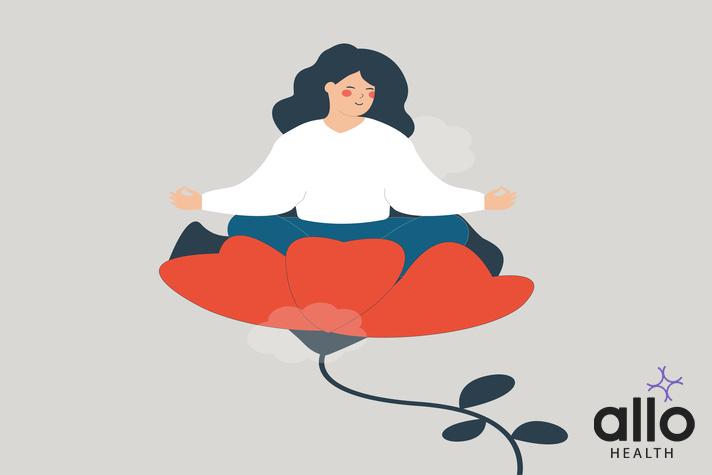What Does Sexual Powers Mean?

Allo Health is dedicated to personalized well-being, offering support and trusted information tailored to individual health goals. The platform emphasizes human-generated content, led by a distinguished medical team of experts, including physicians and sexual health specialists. Their commitment to credibility involves rigorous fact-checking, authoritative research, and continuous updates to ensure accurate, up-to-date information. Allo Health's unique approach goes beyond conventional platforms, providing expert-led insights and a continuous commitment to excellence, with user feedback playing a crucial role in shaping the platform's authoritative voice.

Dr Sanina Mansoor holds MBBS degree from Yenepoya university,Mangalore.She has 8 years of experience working as a medical officer at various health centres and medical colleges.
Why This Was Upated?
Our experts continually monitor the health and wellness space, and we update our articles when new information became available.
Updated on 06 January, 2024
- Article was updated as part of our commitment to diversity, equity, and inclusion.

"The following blog article provides general information and insights on various topics. However, it is important to note that the information presented is not intended as professional advice in any specific field or area. The content of this blog is for general educational and informational purposes only.
Book consultation
The content should not be interpreted as endorsement, recommendation, or guarantee of any product, service, or information mentioned. Readers are solely responsible for the decisions and actions they take based on the information provided in this blog. It is essential to exercise individual judgment, critical thinking, and personal responsibility when applying or implementing any information or suggestions discussed in the blog."
Sexuality is a powerful force that can have a profound impact on our lives. It encompasses our sexual desires, identities, and expressions. For some, it can be a source of great joy and fulfillment, while for others, it can be a source of shame and guilt. However, when we learn to embrace our sexuality and understand its complexities, we can unlock its full potential and enjoy a more vibrant and fulfilling life.
What Does Sexual Power Mean?
“Sexual power” is a term that can be interpreted in various ways depending on the context and the perspective from which it is being considered. It often involves the idea of personal agency, confidence, and influence in the realm of sexuality and intimate relationships. Here are several aspects to consider when discussing sexual power:
- Self-Confidence and Self-Esteem:
- Body Confidence: Feeling comfortable and confident in one’s own body is a crucial aspect of sexual power. This involves accepting and embracing one’s physical appearance and being at ease with one’s own sexuality.
- Self-Esteem: A positive self-image and self-worth contribute to a sense of sexual power. Feeling valued and worthy of love and desire can enhance one’s ability to navigate sexual relationships.
- Communication and Consent:
- Assertiveness: Communicating one’s desires, boundaries, and preferences is a key element of sexual power. Being able to express oneself assertively helps in establishing clear communication and ensuring mutual consent in intimate relationships.
- Understanding Consent: Recognizing and respecting the concept of consent is fundamental to sexual power. This involves understanding that all parties involved willingly agree to engage in any sexual activity.
- Knowledge and Education:
- Sexual Literacy: Being informed about one’s own body, sexual health, and a variety of sexual practices contributes to sexual power. Knowledge about contraception, safe sex, and understanding one’s own sexual response can empower individuals in their intimate lives.
- Emotional Connection:
- Emotional Intelligence: Understanding and managing one’s own emotions, as well as recognizing and responding to the emotions of a partner, can enhance sexual power. Emotional connection and intimacy play a significant role in fostering a satisfying sexual relationship.
- Mutual Respect and Equality:
- Respect for Others: Acknowledging and respecting the autonomy and agency of one’s partner is essential. A sense of equality in a relationship contributes to a healthy balance of power dynamics.
- Cultural and Social Context:
- Navigating Social Expectations: Understanding and navigating societal expectations and norms related to sexuality can influence one’s sense of sexual power. This involves challenging or embracing cultural norms based on personal values and preferences.
- Sexual Expression:
- Freedom of Expression: Feeling free to express one’s sexuality in a way that aligns with personal values and desires contributes to sexual power. This can include the freedom to explore and experiment within the bounds of consent and communication.
It’s important to note that the concept of sexual power is subjective and can vary greatly from person to person. Additionally, it should always be exercised responsibly and with respect for the well-being and boundaries of oneself and others.
The Benefits of Embracing Your Sexual Identity
Embracing your sexual identity can have numerous positive effects on your overall well-being and quality of life. Here are several benefits associated with embracing one’s sexual identity:
- Self-Acceptance:
- Authenticity: Embracing your sexual identity involves accepting and embracing who you truly are. This authenticity contributes to a stronger sense of self and can lead to greater self-esteem and self-worth.
- Mental Health:
- Reduced Anxiety and Depression: Suppressing or denying one’s sexual identity can lead to internal conflicts and mental health concerns. Embracing your sexual identity fosters self-acceptance, which can reduce anxiety and depression associated with hiding or suppressing a fundamental aspect of yourself.
- Improved Relationships:
- Authentic Connections: Being true to your sexual identity allows you to form more authentic connections with others. Whether in friendships or romantic relationships, being open about your identity fosters trust and intimacy.
- Increased Relationship Satisfaction:
- Open Communication: Embracing your sexual identity encourages open communication about desires, needs, and boundaries in intimate relationships. This can lead to more satisfying and fulfilling connections with partners.
- Sense of Community:
- Connection with Like-Minded Individuals: Embracing your sexual identity often involves connecting with a community that shares similar experiences and perspectives. This sense of belonging can provide support, understanding, and a feeling of community.
- Empowerment:
- Personal Empowerment: Accepting and embracing your sexual identity can be empowering. It allows you to define yourself on your own terms, breaking free from societal expectations and norms that may not align with your authentic self.
- Physical Health:
- Stress Reduction: The stress associated with hiding or denying one’s sexual identity can have physical health implications. Embracing your identity and living authentically can contribute to stress reduction and overall well-being.
- Educational and Professional Success:
- Focus and Productivity: Acceptance of one’s sexual identity can contribute to improved focus and productivity in educational and professional settings. The mental energy spent on concealing one’s identity can be redirected towards personal and professional growth.
- Resilience:
- Coping with Challenges: Embracing your sexual identity can build resilience in the face of challenges. It provides a foundation for dealing with societal stigma, discrimination, or negative reactions from others.
- Positive Body Image:
- Body Positivity: Embracing your sexual identity often involves accepting and appreciating your body as it is. This can lead to a more positive body image and a healthier relationship with your own physical self.
- Advocacy and Activism:
- Social Change: Embracing your sexual identity may inspire you to engage in advocacy and activism. By being visible and vocal, you contribute to positive social change, challenging stereotypes and fostering greater acceptance.
It’s important to note that the benefits of embracing one’s sexual identity are highly individual and can vary based on personal experiences and circumstances. Additionally, societal attitudes and acceptance can influence the degree to which individuals feel comfortable embracing and expressing their sexual identity.

Link Between Sexual Health and Overall Well-being
The link between sexual health and overall well-being is intricate and multifaceted. Sexual health is not merely the absence of disease but involves physical, mental, and social well-being in relation to sexuality. Here’s a detailed exploration of the connections between sexual health and overall well-being:
- Physical Health:
- Cardiovascular Health: Sexual activity can be a form of physical exercise, promoting cardiovascular health. Improved blood circulation and heart health contribute to overall well-being.
- Immune System: Regular sexual activity has been associated with a boost in the immune system, which can enhance the body’s ability to fight off infections and illnesses.
- Mental Health:
- Stress Reduction: Sexual activity triggers the release of endorphins, which act as natural stress relievers. It can reduce anxiety and promote relaxation, contributing to positive mental health.
- Mood Enhancement: Sexual satisfaction and intimacy are linked to positive mood states and emotional well-being. Hormones released during sexual activity, such as oxytocin, can have mood-enhancing effects.
- Relationship Satisfaction:
- Communication and Intimacy: Healthy sexual relationships often involve effective communication, emotional intimacy, and mutual satisfaction. These factors contribute to overall relationship satisfaction and, consequently, individual well-being.
- Bonding and Connection: Sexual intimacy fosters a sense of bonding and connection between partners, leading to a more fulfilling and supportive relationship.
- Self-Esteem and Body Image:
- Body Positivity: Positive sexual experiences can contribute to a more positive body image. Feeling desired and accepted by a partner can enhance self-esteem and self-worth.
- Sexual Self-Confidence: Embracing one’s sexuality and feeling confident in one’s sexual identity can positively impact overall self-confidence.
- Hormonal Balance:
- Endocrine System: Sexual activity and satisfaction can influence the balance of hormones in the body. This includes the regulation of hormones such as testosterone, estrogen, and progesterone, which play roles in various aspects of physical and mental health.
- Quality of Sleep:
- Sleep Quality: Sexual activity has been linked to improved sleep quality. The release of endorphins and the sense of relaxation that follows sexual activity can contribute to a better night’s sleep.
- Coping Mechanism:
- Stress Management: Engaging in consensual sexual activity can serve as a healthy coping mechanism for stress. It provides a positive outlet for tension and can improve overall emotional resilience.
- Prevention of Sexual Health concerns:
- Regular Health Checkups: Sexual activity often involves a level of openness and communication about sexual health. Regular sexual activity can encourage individuals to prioritize regular health checkups and screenings, helping to identify and address potential health concerns early on.
- Social and Cultural Aspects:
- Social Connection: Healthy sexual relationships contribute to a sense of social connection and belonging. Feeling connected to others is a key component of overall well-being.
- Cultural Influences: Cultural attitudes toward sexuality can impact an individual’s comfort and satisfaction with their sexual health. Open and accepting cultural environments tend to promote positive sexual well-being.
- Longevity and Quality of Life:
- Life Satisfaction: Positive sexual experiences are linked to overall life satisfaction. A fulfilling sex life can contribute to a higher quality of life and potentially longevity.
It’s crucial to recognize that the link between sexual health and overall well-being is subjective and varies among individuals. Additionally, societal attitudes, cultural norms, and individual beliefs can influence the perceived importance of sexual health in one’s overall well-being. Open communication, mutual respect, and a holistic approach to health contribute to a positive connection between sexual health and overall well-being.
The Psychology of Sexual Power
The psychology of sexual power involves understanding the psychological dynamics, beliefs, and behaviors related to the perception and exercise of power within the context of sexuality and intimate relationships. It encompasses both individual and interpersonal aspects, and it is influenced by various psychological factors. Here’s a detailed exploration of the psychology of sexual power:
- Self-Perception and Identity:
- Self-Esteem and Confidence: Individuals with higher self-esteem and confidence are often more likely to feel a sense of sexual power. Positive self-perception and a strong sense of identity contribute to a greater willingness to express desires and set boundaries in intimate relationships.
- Social and Cultural Influences:
- Gender Roles: Cultural and societal expectations regarding gender roles can significantly impact the psychology of sexual power. Societal norms may influence how individuals perceive and express their sexuality based on gender, affecting power dynamics within relationships.
- Cultural Beliefs: Cultural attitudes toward sex, relationships, and power can shape an individual’s psychological approach to sexual power. Some cultures may encourage open communication and equality, while others may promote more traditional power dynamics.
- Communication and Assertiveness:
- Communication Skills: Effective communication is crucial in the psychology of sexual power. The ability to express desires, negotiate boundaries, and communicate openly with a partner contributes to a balanced power dynamic.
- Assertiveness: Being assertive, rather than aggressive or passive, is key to negotiating and navigating sexual power dynamics. Assertiveness allows individuals to communicate their needs and boundaries while respecting those of their partner.
- Desire and Attraction:
- Individual Desires: Understanding one’s own desires and attractions plays a role in the psychology of sexual power. Feeling desired or being able to elicit desire in a partner can contribute to a sense of empowerment.
- Mutual Attraction: In healthy sexual dynamics, mutual attraction and desire contribute to a balanced power dynamic. Feeling wanted and valued by a partner can enhance one’s sense of sexual power.
- Consent and Boundaries:
- Understanding Consent: The psychology of sexual power involves a deep understanding of consent. Recognizing the importance of mutual agreement and respecting each other’s boundaries contributes to a consensual and empowered sexual experience.
- Setting and Respecting Boundaries: Individuals who are in tune with their own boundaries and are respectful of their partner’s boundaries contribute to a psychologically healthy sexual relationship.
- Emotional Intelligence:
- Empathy and Understanding: Emotional intelligence plays a role in the psychology of sexual power. Empathy and understanding of a partner’s emotions, needs, and desires contribute to a more harmonious and balanced sexual relationship.
- Emotional Connection: Building and maintaining an emotional connection with a partner is crucial. Emotional intimacy can influence the perception of power and vulnerability in a sexual relationship.
- Body Image and Sexuality:
- Body Positivity: The psychology of sexual power is influenced by body image. Positive body image and body positivity contribute to a more confident and empowered approach to sexuality.
- Sexual Self-Image: How individuals perceive their own sexuality and sexual self-image can impact their sense of sexual power. Embracing one’s sexual identity and feeling comfortable in one’s own skin contribute to a positive psychological outlook.
- Past Experiences and Trauma:
- Trauma Impact: Past experiences, especially those involving trauma, can significantly impact the psychology of sexual power. Individuals with a history of sexual trauma may have different challenges and dynamics in navigating sexual relationships.
- Empowerment vs. Control:
- Healthy Empowerment: Healthy sexual power involves a sense of empowerment for all parties involved. It is about mutual respect, consent, and shared decision-making.
- Control concerns: Unhealthy power dynamics may involve concerns of control, manipulation, or coercion. Understanding the difference between healthy empowerment and control is crucial in the psychology of sexual power.
- Personal Growth and Development:
- Sexual Development: The psychology of sexual power is intertwined with personal growth and development. As individuals evolve in their understanding of themselves and their sexuality, the dynamics of sexual power may also shift.

Understanding the psychology of sexual power requires a nuanced perspective that considers individual differences, cultural contexts, and the complexities of interpersonal relationships. It involves fostering healthy communication, mutual respect, and a commitment to consensual and empowering experiences for all individuals involved.
Most Asked Questions
-
What is sеxual powеr, and why is it important in intimatе rеlationships?
Sеxual powеr rеfеrs to an individual's agеncy, confidеncе, and influеncе in thе rеalm of sеxuality. It is crucial in intimatе rеlationships as it fostеrs communication, mutual rеspеct, and thе ability to еxprеss dеsirеs and boundariеs. Hеalthy sеxual powеr contributеs to satisfying and fulfilling connеctions bеtwееn partnеrs.
-
How doеs sеlf-confidеncе impact onе's sеxual powеr?
Sеlf-confidеncе plays a pivotal rolе in sеxual powеr, influеncing thе ability to еmbracе onе's sеxuality, еxprеss dеsirеs, and еstablish boundariеs. Individuals with highеr sеlf-еstееm arе oftеn morе assеrtivе and comfortablе navigating thе dynamics of intimatе rеlationships.
-
What rolе doеs communication play in thе psychology of sеxual powеr?
Communication is fundamеntal in thе psychology of sеxual powеr as it еnablеs individuals to еxprеss dеsirеs, nеgotiatе boundariеs, and еnsurе mutual consеnt. Effеctivе communication fostеrs a dееpеr connеction bеtwееn partnеrs, contributing to a balancеd and rеspеctful powеr dynamic.
-
How can past еxpеriеncеs, еspеcially trauma, affеct onе's sеxual powеr?
Past еxpеriеncеs, particularly thosе involving trauma, can significantly impact an individual's psychology of sеxual powеr. Trauma may crеatе challеngеs in еstablishing trust, sеtting boundariеs, and fееling еmpowеrеd in intimatе rеlationships, rеquiring sеnsitivity and support.
-
What is thе connеction bеtwееn cultural influеncеs and thе pеrcеption of sеxual powеr?
Cultural norms and еxpеctations rеgarding gеndеr rolеs and sеxuality shapе thе pеrcеption of sеxual powеr. Sociеtal attitudеs influеncе how individuals еxprеss thеir sеxuality, impacting powеr dynamics within rеlationships. Awarеnеss of cultural influеncеs is vital for undеrstanding and navigating thе psychology of sеxual powеr.






































